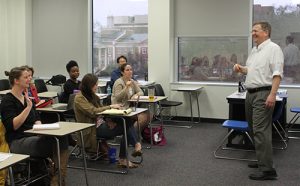
By: Shelby Steuart
The gender pay gap remains a pervasive problem across occupations in the United States. According to a Pew Research Center analysis, women earned 82 percent of what men earned in 2017.
While state policymakers have strengthened efforts to eliminate the gender pay gap, the damaging effects continue to linger, but why? A few traditional arguments are that women miss opportunities in order to have children and care for their families; women are not trusted as leaders; and women are too trusting of their superiors when negotiating their salary.
SPIA professor Dr. Andrew Whitford recently published an article that addresses the argument of trust in the workplace. Whitford, along with co-author Dr. Holona Ochs from Lehigh University, created an experimental environment that stripped away institutional factors, like workplace culture, in order to better compare men and women’s behavior surrounding trust when negotiating salaries. The article, “Experimental Tests for Gender Effects in a Principal-Agent Game,” challenges the notion that the pay gap between women and men exists because women are unable to negotiate.
In the experiment, Whitford and Ochs paired participants to negotiate a labor-wage contract. The results showed no difference between the way women and men negotiate.
Whitford explains, “The answer we come to is in some ways a non-finding: women do not negotiate differently. There is a bit of evidence that they are more trustworthy, maybe even a little more trusting, but we don’t see evidence that changes outcomes for them, in this particular context.”
These findings indicate that stereotypes that portray women as unable to negotiate because of internal characteristics are not to blame. Failures to negotiate are more likely due to external factors. This conclusion reveals that in order to address the gender pay gap, individuals and organizations need to evaluate the characteristics surrounding a negotiation situation.
Whitford concludes, “We know there are broader based gender differences in terms of outcomes. Our argument is we don’t need to point to something that is happening inside the person’s decision framework, but rather we need to point to the context, culture and those kinds of factors that can influence a person’s decision.”
Whitford and Ochs will continue to use this data set to examine the role of trust in the workplace. Their next project will consider the effects of trust on teamwork.








